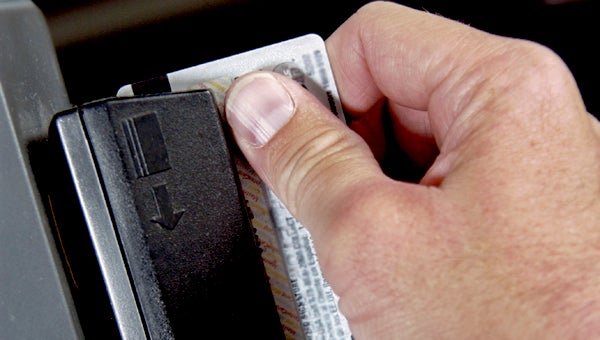EMV conversion may mean high costs for local businesses
Published 7:00 pm Monday, November 2, 2015
It’s been about a month since businesses nationwide were asked to convert to EMV-compliant card machines, but some business owners have expressed concern about the new system and have yet to convert their machines.
EMV stands for Europay, MasterCard and Visa, and is a worldwide standard for inter-operation of integrated circuit cards. Newer credit and debit cards from these companies have been issued with a microchip embedded, and the card information is read by the payment machine via the chip or by swiping the card, rather than only swiping.
As the United States slowly begins the switch to accommodate chip-embedded cards, Oct. 1 marked the deadline for which businesses without EMV-compliant machines could avoid any liability for fraud cases. As of now, either the banks that issued the cards or the businesses will be held responsible, according to “Payments Leader” documents from Lentz Stowe, director of the Beaufort County Community College Small Business Center.
The embedded chip makes card fraud a more difficult feat, as the chip creates a transaction code for each purchase that cannot be used again or duplicated in the event of fraud, according to the document.
“Despite the best efforts of global law enforcement agencies, global losses have risen steadily, increasing pressure to find a global solution. Annual costs of card fraud in the U.S. alone are estimated at $8.6 billion per year. Experts believe that figure will rise to $10 billion or higher by 2015, especially if the U.S. does not make significant progress with chip card adoption,” the document stated.
But despite the changes being hailed as a safety precaution to protect customers, some local business owners are concerned about the cost of installing compatible technology.
Russell Smith, owner of Russell’s Men Shop in downtown Washington, said he is still wary of the costs of the new technology.
For him, purchasing a machine that reads the card information via card insertion would cost $779, and purchasing a machine that reads the chip with a swipe would cost $999, he said.
“It’s very expensive,” Smith said. “I have not updated to the machine that accepts a chip. … I don’t know if we’re going to or not.”
Although his business could now be liable for an instance of card fraud, Smith said he doesn’t think that risk outweighs the cost of conversion to the new system at this point.
“Being a small, local, independent merchant, I know most of my customers,” he said. “My chances of fraud are much slimmer than a bigger store’s.”
“I know almost everybody who comes in,” Smith said, adding that even if he doesn’t know someone, he always takes the time to get to know a new customer.
Along with the cost, he said he is also concerned about how smoothly the new machine would work during the busy holiday season, and he thinks the EMV technology may slow down transactions.
Despite his concerns about EMV compliance, Smith said he still thinks accommodating card payments is important to his business, and makes sure to accept all types of cards.
“It’s part of doing business today,” he said. “We take every card that’s out there.”
“If you’re a merchant today, you almost have to take them all,” Smith said. “It’s just the way everything is geared now.”






